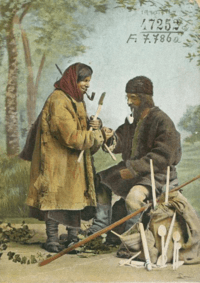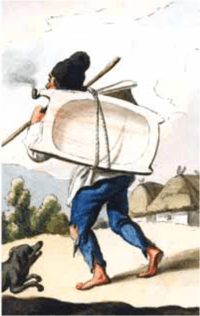Boyash
Boyash (or Bayash; Romanian: Băieşi, Hungarian: Beás, Slovak: Bojáš, South Slavic: Bojaši) refers to a Romani ethnic group living in Romania, southern Hungary, northeastern Croatia, western Vojvodina, Slovakia, the Balkans, but also in the Americas.[1] Alternative names are Rudari (Ludari), Lingurari and Zlătari.[2]
| Part of a series on |
| Romani people |
|---|
|
Diaspora
|
|
History

The Boyash are a branch/caste of the Roma who were forced to settle in the 14th century in the Apuseni Mountains, located in Transylvania, and work as slaves in mining (a regionalism for mine in Romanian: "baie," from Middle Age Slavonic).
At the end of the 16th century the Boyash started migrating towards the south, in Wallachia, and the east, in Moldavia, where they were held as slaves together with other Romani groups (until the slavery was abolished in 1855-56).
Another name for the Boyash, Rudari, comes from the Slavic ruda ("metal", "ore"). As the mines became inefficient, the Boyash people were forced to readjust by earning their living making wood utensils (Lingurari means "spoon-makers" in Romanian; also cf. Serbian ruda, Hungarian rúd, Romanian rudă meaning "relative", but also "rod, pole, stick"). The nickname Kashtale ("wood-workers") was also given to them by the Romani-speaking Roma and it has remained in Romani as a more general word for a Rom who does not speak Romani.
After the point at which they began to make wood tools they scattered themselves in isolated communities. The consequence of this is that nowadays they speak a distinct archaic dialect of Romanian, with borrowings from other surrounding languages.
Population

After the liberation of the Roma from slavery (by the middle of the 19th century), many emigrated to other countries, especially Hungary and the Balkans, but also as far as the Americas, South Africa and Australia.[3]
In 1993, about 14,000 of the 280,000 recorded Hungarian Roma were Boyash.[4]
In Croatia, the Boyash are settled in several small communities along the Hungarian border in the regions of Međimurje, the Podravina, Slavonija and Baranja with an overflow of settlers living in the Apatin county of Vojvodina, Serbia.[5] 2005 saw the Boyash language of Croatia published in its own alphabet for the first time in the Catholic Catechism, published by the HBK Glas Koncila in Zagreb.[6] In 2007, the first Bible—a children's Bible—was published by OM EAST in Austria and facilitated by The Romani Bible Union.[7]
Names in other languages
In English, the commonly accepted name for the ethnic group is Boyash, however in contemporary Bulgaria the terms Ludari and Rudari are in common use, while in Romania both terms are present in some form: Rudari and Băieşi.[8]
For the same ethnic group in Hungary and Croatia the terms Beyash and Bayash (Bajaši) are now officially used.[9] The ethnonym Banyash ("miner") in Serbia is known only among the group settled in Bačka region, living along the river Danube, near the border with Croatia and Hungary.[10] This term is only sporadically understood, and not used among some other Banyash groups in the Serbian Banat region, e.g. the village of Uljma.[11]
They are also known by many appellations based on trades; in addition to Rudari/Ludari ("miners", from Serbian and Bulgarian ruda "ore, metal") they are known as Kopanari ("cradle-makers", from Serbian and Bulgarian kopanja "wooden box"), Koritari ("trough-makers"), Lingurara ("spoon-makers", cf. Romanian lingură "spoon") and Ursari (cf. Romanian urs "bear") or Mechkara ("bear-trainers").[12]
Education
Education in the Romanian language is available only for the Banyash living in Romanian villages in the Serbian Banat, as well as in Hungary, in the beás subdialect of the Romanian language spoken by Boyash communities in (central and western) Hungary.[13]
During the last few years there have been several attempts on behalf of local non-governmental organizations in East Bačka region to introduce optional classes in Romanian.[14] According to 2004 field research data, only two such projects are still going on there: optional classes in Romanian in the village of Vajska, and kindergarten in the local Ardeal dialect in Bački Monoštor, attended by 20 pupils altogether.[15]
References
Notes
- Ludari in USA
- Smith, David James (2016-06-16). Only Horses from Wild. ISBN 9781365197734.
- Liégeois, Jean-Pierre; Europe, Council of (January 2007). Roma in Europe. ISBN 9789287160515.
- http://www.gitanos.org/documentos/1.1-KEN-his_HistoricalDictionaryoftheGypsies.pdf
- Bódi, Zsuzsanna (1997). "Studies about Boyash Gypsies in Hungary".
- Bódi, Zsuzsanna (1997). "Studies about Boyash Gypsies in Hungary".
- http://www.hungarianreview.com/print/20150514_bibles_for_communist_europe_a_cold_war_story_part_1
- Liégeois, Jean-Pierre (January 2012). The Council of Europe and Roma: 40 Years of Action. ISBN 9789287169457.
- Miskovic, Maja (2013-07-18). Roma Education in Europe: Practices, policies and politics. ISBN 9781136280658.
- Kállai, Ernő (2002). The Gypsies/The Roma in Hungarian Society. ISBN 9789638577467.
- Sikimić, Biljana (2005). "Banjaši na Balkanu: Identitet etničke zajednice".
- Guy, Will (2001). Between Past and Future: The Roma of Central and Eastern Europe. ISBN 9781902806075.
- Cf. a (.pdf) paper issued by the Hungarian ministry of education (as of May 25, 2006) containing the official schools curriculum for Boyash pupils, reading, writing and the type of tests and examinations in their language, which is based on the Romanian subdialects spoken in western Transylvania (esp. in Crişana) and Banat, containing numerous borrowings from the Hungarian language; the script is an adaptation based on Hungarian and Romanian graphems :"Beás nyelv emelt szintű írásbeli vizsga, 2006" (PDF). Archived from the original (PDF) on 2012-03-17. Retrieved 2011-03-29. .
- Sutherland, Anne (July 1986). Gypsies: The Hidden Americans. ISBN 9781478610410.
- Kontra, Mikl¢s (January 1999). Language, a Right and a Resource: Approaching Linguistic Human Rights. ISBN 9789639116641.
Bibliography
- Kemény, István: The Structure of Hungarian Roma Groups in Light of Linguistic Changes
- Biljana Sikimić, Linguistic Research of Small Exogamic Communities: the Case of Banyash Roumanians in Serbia
- Ian Hancock. The Pariah Syndrome
- Marushiakova et al. Identity Formation among Minorities in the Balkans: The cases of Roms, Egyptians and Ashkali in Kosovo
[https://books.google.com/books?id=M10xAQAAIAAJ&q=boyash+gypsies&dq=boyash+gypsies&hl=en&sa=X&ved=0ahUKEwjZy9Wv38zkAhWEup4KHb5SBPYQ6AEIKTAA Studies about Boyash Gypsies in Hungary book https://books.google.com › books
Zsuzsanna Bódi - 1997]